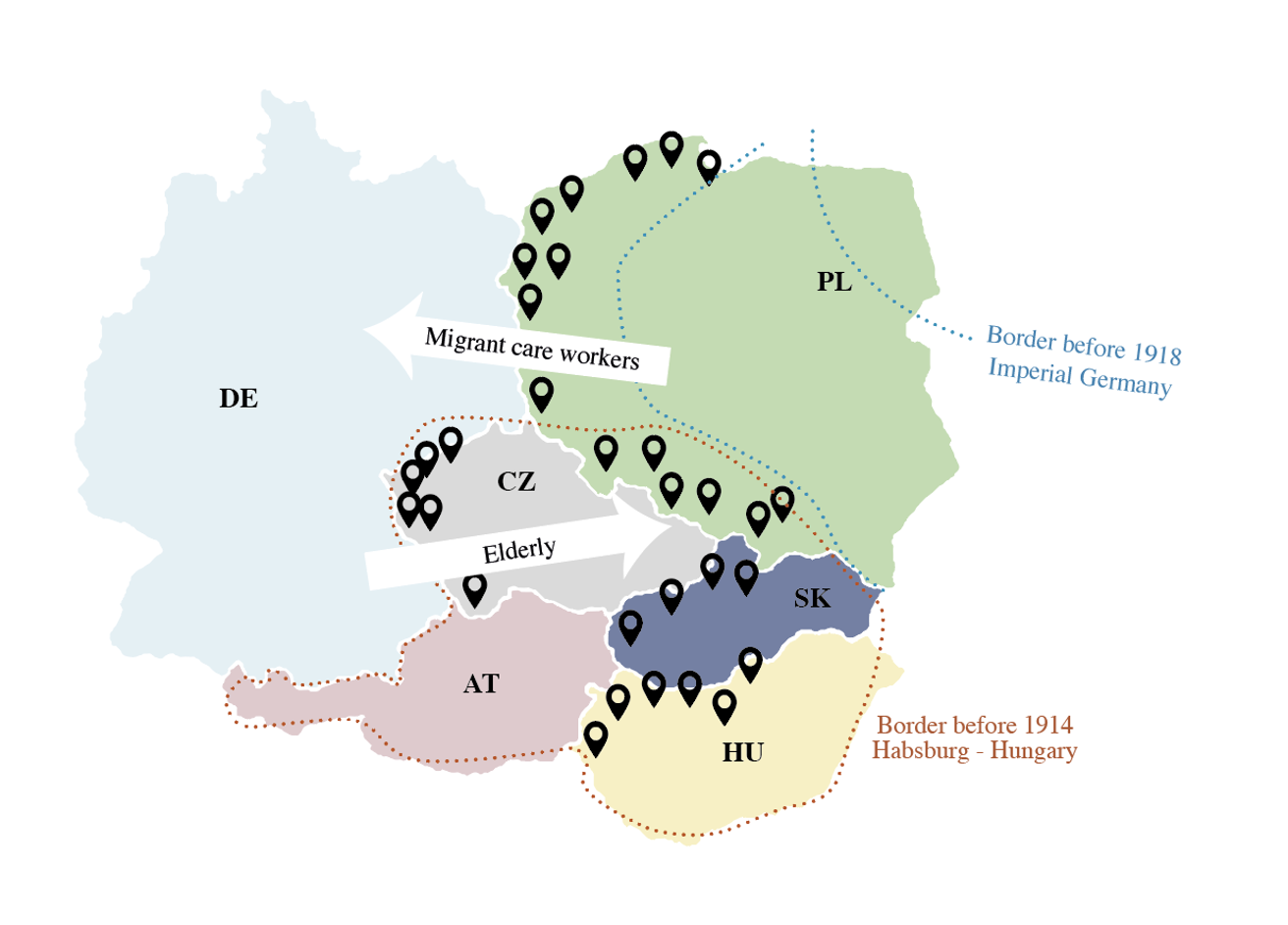The European Research Council (ERC) has this year awarded Starting Grants to eight UvA researchers. The laureates are: Thijs Bol, Janna Cousijn, Efstratios Gavves, Imke Harbers, Kristine Krause, Sanne Kruikemeier, Boris Noordenbos and Damian Trilling. Their projects are respectively about: labour market change and careers, youth alcohol and cannabis use, expectational visual artificial intelligence, undocumented citizens, care relocation, microtargeting and digital influence, conspiracy theories in Eastern Europe, and feedback loops in news consumption.
A Starting Grant is a personal grant of about €1.5 million and provides research support to talented researchers for a period of five years.
The recipients:
Thijs Bol (Amsterdam Institute for Social Science Research): From School to Career: Towards A Career Perspective on the Labour Market Returns to Education
How do we educate the workforce of the future? In times of major technological change, does specialist vocational training or general training offer better career prospects on the labour market? An important hypothesis is that workers with vocational training have relatively more difficulty remaining employed later in their careers because their specialist skills have become outdated. In his project, Thijs Bol and his team will explore these issues by mapping careers in six countries: Germany, the Netherlands, Poland, Sweden, Switzerland, and the United Kingdom. An important innovation of the project is that labour market change will be measured by analysing millions of historical online job vacancy texts. In Bol’s project, this vacancy data is linked to population registers and existing panel surveys in order to answer the question of how resilient careers of workers with a general or a specific training are against rapid changes in the labour market.

Janna Cousijn (Psychology Research Institute): Aging Brain Matter: A Developmental Key to Addiction Risk and Resilience
During adolescence, we see a sharp increase in alcohol and cannabis problems, but also remarkable recovery rates, as most adolescents at some point cut down or stop without treatment. Brain development probably plays an important role in this, and in particular the unique social sensitivity and learning flexibility of adolescents. However, we still know too little about this and comparisons between adolescents and adults are largely missing. Janna Cousijn will follow adolescent and adult alcohol and cannabis users for three years. She will focus on both social and cognitive processes and gradually develop new methods to map brain processes and behaviour. By studying similarities and differences between adolescents and adults, she hopes to uncover both common and unique mechanisms of addiction risk and resilience, that can ultimately improve treatment.
Efstratios Gavves (Informatics Institute): Expectational Visual Artificial Intelligence
Visual artificial intelligence automatically interprets what happens in visual data such as videos. Research so far has looked at queries such as "Is this person playing basketball?", "Find the location of the cerebral infarction", or "Follow the glacier fractures in satellite images". All these queries are about visual observations of something that has already taken place. Today’s algorithms focus on explaining past visual observations. But we also want to be able to look to the future: "Is this person going to get something out of his pocket?", "Where will the tumour be in 5 seconds?", or "How and when is the glacier going to fracture?". The next generation of algorithms must be able to predict what will happen based on visual observations in the past. In this way, visual artificial intelligence should eventually also make it possible to prevent something, instead of explaining what happened afterwards. The biggest challenge here is learning temporality in visual sequences. In his project, Efstratios Gavves will focus on fundamental research questions in the computational learning of temporality and the automatic interpretation of possible future visual sequences.
Imke Harbers (Amsterdam Institute for Social Science Research): Legal Identity for All?
One in seven people in the world lacks documents such as a birth certificate, ID card or passport to prove their legal identity. This prevents them from proving their status as citizens in their own country and often makes it impossible to exercise the rights associated with citizenship. The United Nations, in its so-called Sustainable Development Goals, has expressed the ambition to achieve a "legal identity for all". Why are there so many undocumented citizens? Is this simply a matter of weak states or is there a political motive behind it? In her project, Imke Harbers will investigate how and why states invest in civil registration, and how and why citizens decide to obtain documents. Harbers and her team will collect and analyse country-level data on undocumented citizens, and will also conduct extensive field research in India and Mexico.

Kristine Krause (Amsterdam Institute for Social Science Research): Relocating Care within Europe: Moving the Elderly to Places Where Care is More Affordable
Care for the elderly is expensive and there is a shortage of staff in many Western European countries. One solution has been the hiring of live-in care workers from Eastern Europe. In her project, Krause is examining the reverse phenomenon: ‘care relocation’, in which the person in need of care is relocated to places where care is more affordable. This contested trend, described as ‘geriatric colonialism’, can be seen as an extreme example of the marketisation of care. Krause and her team will study care homes in Poland, the Czech Republic, Slovakia and Hungary, which recruit patients from Austria and Germany at about a third of the cost compared to the home countries. What does care relocation do to people and places involved? Alongside ethnographic studies of daily life in care homes, the team will investigate the relationship between care entrepreneurs and state insurances and the histories of places and regional migration.
Sanne Kruikemeier (Amsterdam School of Communication Research, ASCoR): Hunting for Voters: The Impact of Data-Driven Campaigning on Democracy
The way politicians communicate with citizens has fundamentally changed. With the rapid growth of data-driven (microtargeting) techniques, political messages are increasingly matched to individual voters, in particular online. Many people fear that these data-driven techniques are a harmful phenomenon. They can invade privacy, exclude social groups, and depress turnout during elections. However, political targeting may, for instance, reach citizens who are difficult to reach via traditional campaigning, it can also provide relevant information on issues that individuals find important, and it can mobilise more people to vote, leading to increased inclusiveness and diversity. In her project, Sanne Kruikemeier will investigate the negative and positive effects of online data-driven targeting and digital persuasion in five countries. With her team, she will examine the conditions under which data-driven techniques affects citizens’ attitudes, opinions, and, eventually, voting behaviour.
Boris Noordenbos (Amsterdam School for Cultural Analysis): Conspiratorial Memory: Cultures of Suspicion in Post-Socialist Europe
From speculation about Covid-19 as a biological weapon to allegations of Russian meddling: conspiracy theories are currently at the heart of the most pressing global crises. Recent years have seen a boom in academic interest in conspiracy theories, and in the role of popular culture in their spread. But most of this research focuses on Western Europe and the United States. It is not sufficiently understood how conspiracy cultures from other regions tap into specific ‘cultural memories’ and interpretative traditions. In his project, Boris Noordenbos and his team redirect attention to post-socialist Poland, Belarus, Ukraine and Russia to explore this issue. They analyse conspiracy-based narratives and images in literature, film, television and online platforms, zooming in on recent theories about the Chernobyl nuclear disaster, the current war in eastern Ukraine, and the death of the Polish president Lech Kaczynski in a 2010 plane crash. The project combines cultural analysis with quantitative digital media research to reveal how conspiracy stories circulate in the region, and how they derive their rhetorical force and emotional impact from references to the socialist past.

Damian Trilling (Amsterdam School of Communication Research): Modeling News Flows: How Feedback Loops Influence Citizens’ Beliefs and Shape Societies
Until a few years ago, television, radio and newspapers were the only way news reports reached the public. Everyone received the same ready-made package of news coverage. Today, news consumption is shifting more and more towards people reading individual articles online. User behaviour - along with data and algorithms from social media, search engines and recommendation systems - determines who gets to see what information. Although there are many warnings about filter bubbles and echo chambers, quite the opposite is often the case. Conspiracy theories and so-called fake news, as well as relevant information from action groups or citizens, are not limited to a small bubble, but appear in the traditional media. This is due to ‘feedback loops’. The more something is shared, the more attention it gets, which means in turn that more people will share the message. News consumers, journalists and politicians then label these messages as relevant information, which again gives a message more attention. A self-reinforcing process. Under what circumstances can an obscure theory or a message in a small social media group suddenly end up in the newspaper or in political debates? Damian Trilling will attempt to unravel this process by applying a unique combination of large-scale automated content analysis and social scientific experiments.
This article was first published on 3 September by UvA.




 A unique international forum for public research organisations and companies to connect their external engagement with strategic interests around their R&D system.
A unique international forum for public research organisations and companies to connect their external engagement with strategic interests around their R&D system.